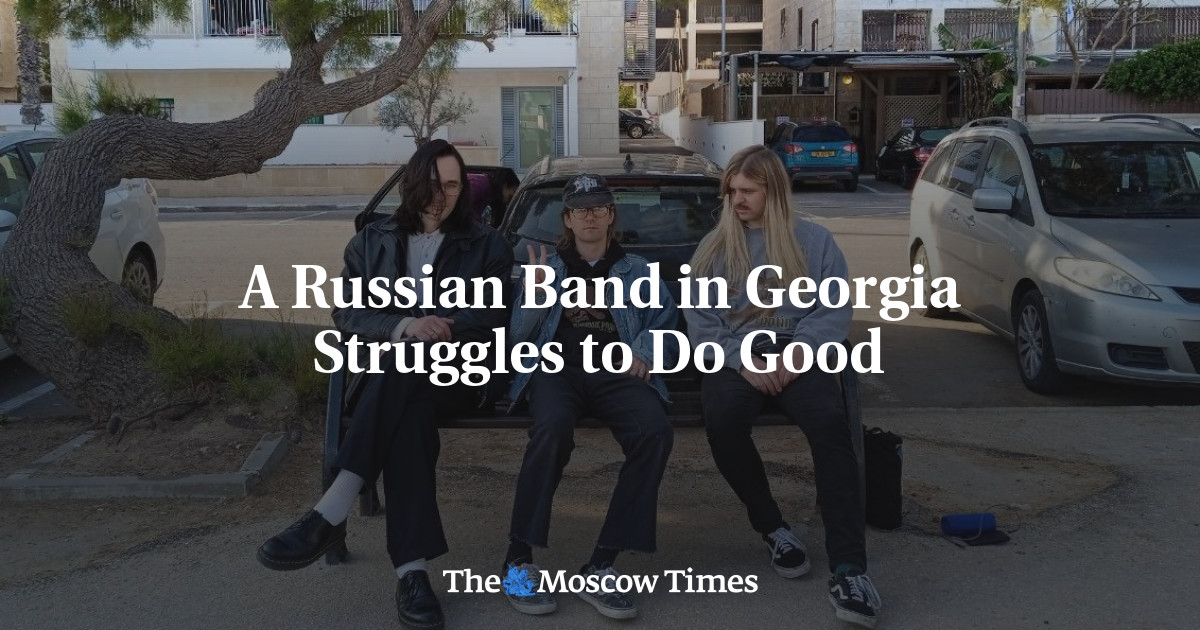
Arseni Morozov’s band had just finished a set in a fundraiser for Ukrainian refugees in a Tbilisi, Georgia bar when the owner unexpectedly took the stage. “Please don’t speak Russian between songs,” he asked the audience. “Not everyone here understands it.”
Morozov, the lead singer of the Russian garage rock band Sonic Death, quickly apologized. It was lucky that the owner even agreed to host the concert to raise funds. Other club-owners turned them down, and Georgian bands had refused to play alongside them in previous concerts.
“It’s not very easy to have concerts here,” Morozov said. “Nobody wants to make any kind of deal with Russians, because in their community this guy might be called a Putinist. When you work with Russians, you are a Putinist.”
Since immigrating to Tbilisi in March 2022, Morozov, drummer Danil Seledtsov, and bass guitarist Igor Mialkin have participated in demonstrations against the war and helped organize benefit concerts through the grassroots organization Volya. But they are just a few of over 100,000 Russian migrants to Georgia, which Russia invaded fifteen years ago. While some Georgians support anti-Putinist migrants, others take issue with even the strongest dissenters settling in their country.
In the weeks after Russia’s invasion, venues made their reasons for refusing to host Volya clear. “Because Russia is an occupier, and 20 percent of Georgia is occupied by Russians. Every club owner told us about this every time,” Morozov said.
Russia has occupied Abkhazia and South Ossetia, two regions along the border, since invading Georgia in 2008. In the five days of war that followed, 396 Georgians were killed, and over 100,000 more were displaced from their homes, according to the Georgian Ministry of Foreign Affairs.
“Whatever is going on in Ukraine, the same was happening here as well — the war crimes, rapes, mass killings,” Ekaterina Shpet, a Georgian tour guide, said.
Yet some Russian migrants know little about their country’s invasion and occupation of Georgia, even as they seek refuge from Russian aggression in that country.
Ali Nuriev, a Georgian student at International Black Sea University, separates Russian migrants into two categories. “There are pro-Putins who think Russia freed Abkhazia and South Ossetia from Georgians,” he said. “The other part is the ones that don’t know anything about this at all.”
“Maybe that’s the worst category of Russians,” Nuriev added. “That makes me the most mad.”
Widespread anti-Russian sentiment is not only palpable, but visible in Georgia’s capital, where some businesses refuse to serve the migrants and anti-Russian graffiti stretches for blocks. “Russia is a terrorist state,” some graffiti read. Or “Russians, go home.” Yet far from feeling alienated by these messages, the members of Sonic Death express approval.
“I start to think about the part of Russian occupant in me, and I start to work with this part when I look at this graffiti,” Morozov said. “I like these graffiti and I think every Russian should see it and think about it.”
“If it was really offensive to you, then there’s something wrong with you and you should go somewhere else,” Mialkin added.
The members of Sonic Death see a moral division between themselves — emigrants in the first months of the war who oppose Putin’s politics — and Russians who emigrated after the September mobilization order. “No one said, ‘Oh, I’m afraid of going to war,’” Vera Pravda, Mialkin’s wife, said. “Our first thought was how can we help [Ukrainians] monetarily? How can we help spiritually? That’s how Volya was formed, and it’s still going strong to this day.”
Seledtsov believes that the band’s work organizing benefit concerts is the best that he can do for Ukrainian refugees. “I want to help these guys right now, but I just can’t,” he said. “If I were a soldier, maybe I would join the Freedom of Russia or something, but I’m not a soldier, I’m a musician.”
Although many Georgians have struggled with the changes brought on by mass migration, some still see an opportunity for the country’s economy to grow. With Russian-owned businesses springing up across Tbilisi, Salome Khvadagiani, the director of the human rights organization Liberty Institute, hopes for a new era of prosperity in Georgia.
“Because of the threat from Russia, the Georgian economy is not really good for investment,” Khvadagiani said. “[But Russian migrants] are coming here with their money, and they are investing it in the Georgian economy.”
Khvadagiani considers Morozov and the members of Sonic Death, whom she first met at an anti-war demonstration organized by the Liberty Institute in April 2022, “good” Russians. “They are creating our arts here,” Khvadagiani said. “They can be beneficial for the economy, and they are beneficial for our cultural processes, too.”
Khvadagiani wants Georgia to welcome more Russians who oppose the war. “I think it would be better if we had, for example, an anti-Putinist hub in Georgia. We could provide a platform for all the anti-Putinists in the world.”
Like thousands of other anti-Putin Russians in Georgia, the members of Sonic Death know that many Georgians don’t want them there. “I write anti-war songs, so I think that’s not fair to say about me, but Georgian people really have right to think that way,” Morozov said. “I can’t condemn them, because I understand their situation.”
Later he adds, “I think that it’s fair for Georgians to have that kind of attitude toward Russians.”





